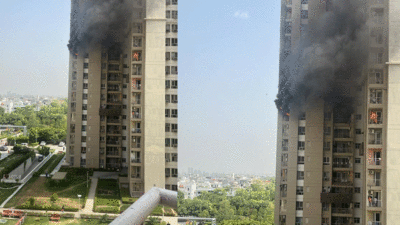Here are some tips to avoid AC fires this summer:
A fire incident occurred early on May 30 in a flat at Noida’s Lotus Boulevard society, Sector 100, reportedly due to an air conditioner explosion. Chief Fire Officer Pradeep Kumar Choubey stated that the fire was confined to one room thanks to the functioning firefighting systems. With summer temperatures soaring, the risk of air conditioner (AC) fires has become a growing concern. Recently, fires caused by AC explosions in Noida and Mumbai have highlighted the importance of AC safety. These incidents underscore the need for vigilance and preventive measures to ensure the safety of your home and loved ones. Here are some steps you can take to reduce the risk of AC fires and stay cool safely:
Regular Maintenance and Inspection
- Annual Professional Servicing: Have your AC unit serviced by a qualified technician at least once a year. Regular maintenance can help identify and fix potential issues before they become serious.
- Filter Cleaning: Clean or replace the AC filter every 1-3 months to prevent blockages that can cause the system to overheat.
- Check Wiring: Inspect the wiring and electrical connections for signs of wear or damage. Loose or frayed wires can lead to short circuits and fires.

Proper Installation
- Qualified Installation: Ensure your AC unit is installed by a certified professional. Improper installation can lead to electrical issues and increased fire risk.
- Adequate Ventilation: Ensure there is sufficient space around the AC unit for proper airflow. Overheating due to poor ventilation can cause fires.
Safe Usage Practices
- Avoid Overloading Circuits: Do not plug your AC into an overloaded power strip or extension cord. It should be plugged directly into a wall outlet capable of handling its power requirements.
- Correct Fuse or Breaker: Use the correct size and type of fuse or circuit breaker as specified by the manufacturer to prevent electrical overloads.
Stay Vigilant for Warning Signs
- Unusual Noises or Smells: If you notice strange noises or a burning smell coming from your AC unit, turn it off immediately and contact a professional.
- Frequent Tripping: If the circuit breaker trips frequently when the AC is running, it could indicate an electrical problem that needs to be addressed.

Emergency Preparedness
- Smoke Alarms: Install smoke alarms in key areas of your home, including near the AC unit. Regularly test and replace batteries as needed.
- Fire Extinguishers: Keep a fire extinguisher accessible and ensure household members know how to use it.
Educate and Inform
- Family Awareness: Make sure everyone in your household is aware of the potential risks and safety measures related to AC use.
- Community Awareness: Share information and tips with neighbors and community members to promote widespread awareness and safety.
By taking these preventive measures, you can significantly reduce the risk of air conditioner fires, ensuring a safe and comfortable summer for you and your family. R














